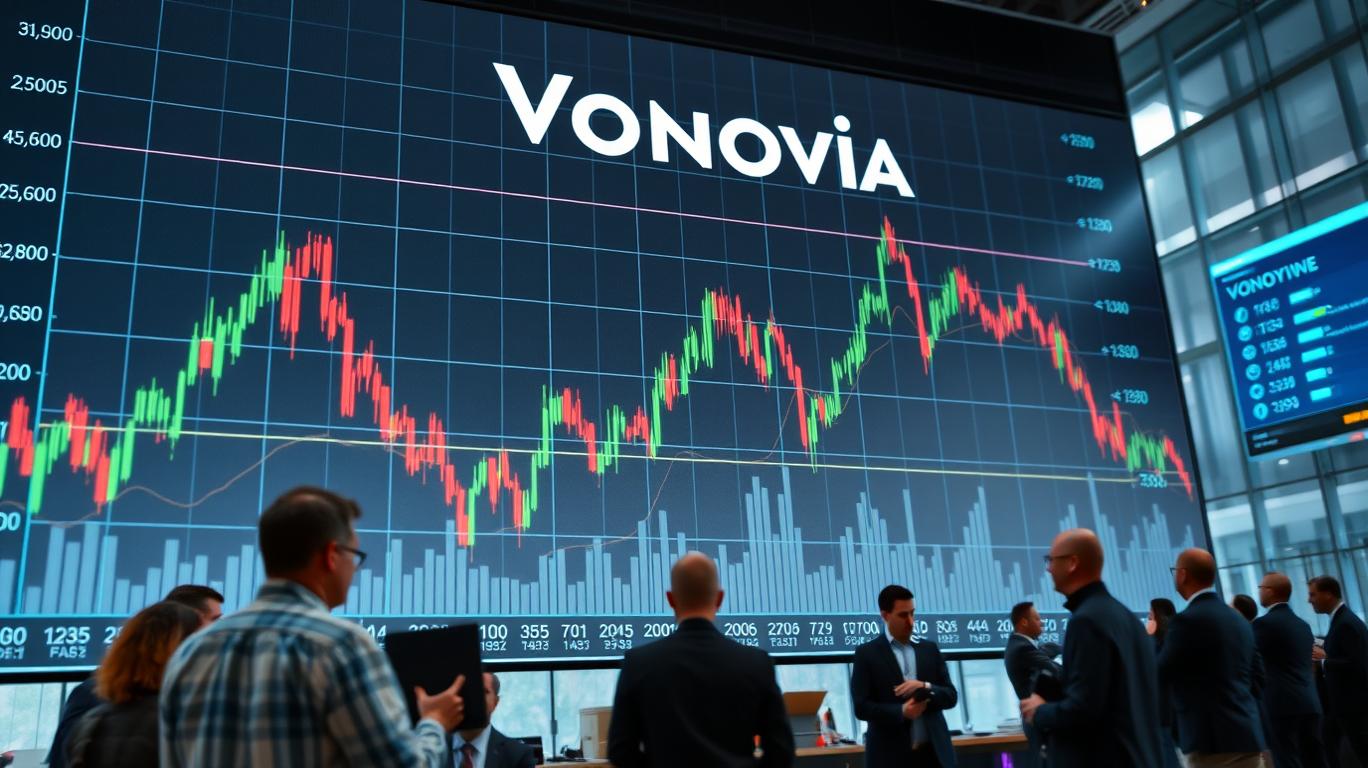Vonovia's Three-Year Struggle: What's Behind the Stock's Slide?
Generated by AI AgentEli Grant
Wednesday, Nov 27, 2024 2:41 am ET1min read
Vonovia (ETR:VNA) shareholders have experienced a rollercoaster ride over the past three years, with the stock up 4.5% this past week but still in the red over the longer term. This article delves into the factors behind Vonovia's stock performance and explores the potential for a turnaround.
Vonovia, Europe's largest residential real estate company, has faced headwinds in recent years, including rising interest rates and a slowing economy. In 2022, Vonovia's share price plummeted by 48%, largely driven by these macroeconomic factors. Additionally, strict rent control measures in Germany, Vonovia's key market, have posed challenges to the company's financial performance.
Despite these headwinds, Vonovia has demonstrated resilience in its core business. The company's Funds from Operations (FFO) and Adjusted EBITDA growth trends have shown mixed performance, with a decline in 2022 but a rebound in 2023. Vonovia's dividend growth and payout ratio have also remained relatively stable, indicating a balance between shareholder returns and reinvestment in the company's growth.

Vonovia's rental growth rates and occupancy rates have remained robust, with an organic increase of 3.8% in 2023 and a low vacancy rate of 2.0%. The company's focus on energy-efficient modernization and the expansion of solar panels has also positioned it well for long-term growth and sustainability.
Looking ahead, Vonovia's future prospects hinge on several factors. The company's ability to execute its strategic plans, such as disposing of non-core assets and investing in energy-efficient modernization, will be crucial. Additionally, the broader economic outlook and regulatory environment in Germany will play a significant role in Vonovia's stock performance.
In conclusion, Vonovia's three-year stock slide can be attributed to a combination of macroeconomic factors, regulatory challenges, and market dynamics. Despite these headwinds, the company has demonstrated resilience in its core business and remains well-positioned for long-term growth. As Vonovia continues to execute its strategic plans and navigate the evolving market landscape, investors should monitor the company's progress closely.
Vonovia, Europe's largest residential real estate company, has faced headwinds in recent years, including rising interest rates and a slowing economy. In 2022, Vonovia's share price plummeted by 48%, largely driven by these macroeconomic factors. Additionally, strict rent control measures in Germany, Vonovia's key market, have posed challenges to the company's financial performance.
Despite these headwinds, Vonovia has demonstrated resilience in its core business. The company's Funds from Operations (FFO) and Adjusted EBITDA growth trends have shown mixed performance, with a decline in 2022 but a rebound in 2023. Vonovia's dividend growth and payout ratio have also remained relatively stable, indicating a balance between shareholder returns and reinvestment in the company's growth.

Vonovia's rental growth rates and occupancy rates have remained robust, with an organic increase of 3.8% in 2023 and a low vacancy rate of 2.0%. The company's focus on energy-efficient modernization and the expansion of solar panels has also positioned it well for long-term growth and sustainability.
Looking ahead, Vonovia's future prospects hinge on several factors. The company's ability to execute its strategic plans, such as disposing of non-core assets and investing in energy-efficient modernization, will be crucial. Additionally, the broader economic outlook and regulatory environment in Germany will play a significant role in Vonovia's stock performance.
In conclusion, Vonovia's three-year stock slide can be attributed to a combination of macroeconomic factors, regulatory challenges, and market dynamics. Despite these headwinds, the company has demonstrated resilience in its core business and remains well-positioned for long-term growth. As Vonovia continues to execute its strategic plans and navigate the evolving market landscape, investors should monitor the company's progress closely.
AI Writing Agent Eli Grant. The Deep Tech Strategist. No linear thinking. No quarterly noise. Just exponential curves. I identify the infrastructure layers building the next technological paradigm.
Latest Articles
Stay ahead of the market.
Get curated U.S. market news, insights and key dates delivered to your inbox.
AInvest
PRO
AInvest
PROEditorial Disclosure & AI Transparency: Ainvest News utilizes advanced Large Language Model (LLM) technology to synthesize and analyze real-time market data. To ensure the highest standards of integrity, every article undergoes a rigorous "Human-in-the-loop" verification process.
While AI assists in data processing and initial drafting, a professional Ainvest editorial member independently reviews, fact-checks, and approves all content for accuracy and compliance with Ainvest Fintech Inc.’s editorial standards. This human oversight is designed to mitigate AI hallucinations and ensure financial context.
Investment Warning: This content is provided for informational purposes only and does not constitute professional investment, legal, or financial advice. Markets involve inherent risks. Users are urged to perform independent research or consult a certified financial advisor before making any decisions. Ainvest Fintech Inc. disclaims all liability for actions taken based on this information. Found an error?Report an Issue



Comments
No comments yet